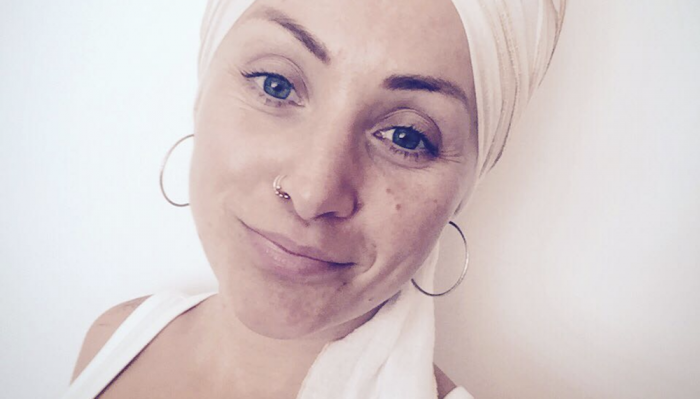Check out Elephant’s Continually-updating Coronavirus Diary. ~ Waylon
During this unprecedented and peculiar time of COVID-19 and the subsequent quarantines in place, I have seen a post doing the rounds recently.
It talks about settling in to this space to read and meditate, to sing and dance and remember how to find the sacred in the simplest of things. It talks about the world slowing down. It talks about humanity healing. It is beautiful. I believe in much of its sentiment.
Yes, of course, it is important to uplift ourselves and each other during this difficulty. Yes, of course, there is value in making the most of this unusual moment and using the time wisely. Yes, of course, there is opportunity to heal and deal with our issues as they arise through the quietness of our confinement.
But, so often in life, our obsession with staying positive—both individually and culturally—means we don’t create the space for the far more complex, real, raw human experience. We don’t create the space for people to feel both free and safe to speak their struggles. It has the potential to silence and shame those who are suffering alone inside their homes, making them feel that there is something wrong with them or their inability to emotionally cope.
I believe we need to stop romanticising lockdown, because quite simply, it is a mental health crisis in the making. Here are some things I would like us all to have in our awareness during this time so that perhaps we can hold space for both ourselves and each other in a more complete and loving way.
The childhood traumas that many of us have suffered are largely to do with connection—or, more to the point, lack of it. The original attachments formed with our family units were unhealthy and dysfunctional, leaving us with a nagging sense of being alone—disconnected from ourselves, others, and the world around us. For many people, being physically isolated in their homes is going to be both triggering and re-traumatising.
Most of us don’t even know that we carry trauma and wounding from childhood. We might suffer with symptoms such as addictions, chronic pain, depression, low self-esteem, or anxiety. We might like our drink a little bit too much, or over-work, or be a tad too fanatic about exercise. We might travel a little too often, always on the run from reality, or socialise obsessively to fend off the loneliness that eats away at us. We may not yet have discovered the pain that lies at the root of these behaviours—because they are designed to keep us from it.
Day-to-day busyness keeps traumatic and invasive memories at bay. Day-to-day activities get in between us and the stored trauma and emotional memory alive in our bodies. In some ways, the day-to-day keeps us from our healing, from dealing with how we are really. But in another sense, it takes the edges off the intolerable. This isn’t always a bad thing. Our day-to-day lives don’t just distract us; they also protect us from the true extent of the hurt that we carry quietly in our hearts.
This is why many of us struggle with being, and are addicted to doing. Yes, taking away daily distractions is a deeply effective way of bringing all the emotional debris to the surface—but I would never recommend that this is done with such intensity without appropriate support.
This level of self-confrontation would ideally only ever take place in a treatment centre or retreat, with the guidance of a professional, or at the very least if none of these are financially accessible, appropriate personal support. The only time we intentionally leave people alone with their demons in this way is in the prison system—and I don’t even agree with that. We have just put our entire population into solitary confinement. It makes people crazy.
It is all well and good saying that this is the moment when we should learn to be with our agitation and emotional pain, when we should meditate, self-investigate, and find silence and solace. But that is easy for those of us already a few steps along the healing path to say.
Perhaps it is a little privileged, a little arrogant, to assume that this will be possible for everyone. It is also under-informed.
As a clinical trauma specialist and practising yogi, I know well the benefits of movement, breath, stillness, and presence. They are invaluable on the healing path.
However, many people with trauma will at first find it categorically impossible to do something like sit for meditation, even for a few minutes. A nervous system locked in hypervigilance can make us severely attention deficit. We cannot be still. We cannot focus. The mind and the body will feel far too restless.
Attempts at such a practice can actually generate a sense of panic over peace. Closing the eyes can be a big no-no in cases of acute trauma, as many people find it simply sends them into flashback. Yoga and mindfulness-type practices that ask you to move your body in certain ways or to place your attention inward can do the same. Breathwork can equally cause more old emotion to surface—it won’t necessarily soothe and centre us.
The reality is that dealing with trauma is a much more delicate dance than most understand. It is one that requires us to dip our toes in and pull them back out again. We have to learn to paddle around in the shallows first.
In effective trauma work, the last thing we ever want to do is unleash a tidal wave of old emotion all in one go. The already overloaded nervous system cannot handle it. To feel it all at once would be, quite frankly, too much.
And that is exactly what will be happening to many people right now.
The kinds of practices the original post mentioned may not be helpful to everyone—at least not in the form we will usually find them on Google or YouTube. Many of us need much more careful guidance.
Add to this that our health is under threat. Add to this that some of us are losing loved ones. Add to this that there are clearly other unknown political agendas at play. Add to this the fact that many people are under enormous financial pressure. Add to this that many people with kids are now unable to access any personal space at all. Add to this that many people are unable to get out in nature—a vital human need—and are being suffocated by four walls, 24 hours, around the clock.
Our freedom of movement has been taken away overnight. We don’t know when it will be returned to us. This uncertainty will add to the intensity.
Many, many people are going to be feeling agitated, angry, depressed, anxious, and afraid. Many, many people will be feeling confused, trapped, and alone, unable to understand the extent of the desperation that is quickly overcoming them.
I want you to know that if you feel these things, regardless of your history, it is unsurprising and it is not shameful. The situation is overwhelming. It is traumatic in and of its own right, and re-traumatising for those of us with unhealed histories.
We will learn much during this time, most definitely. Some of us will learn to be quieter. To need less. Many of us will get precious hours with our loved ones that will be treasured and remembered forever. But most of us will also suffer these lockdowns to one degree or another. Some will end up in serious emotional crisis because of it. Not everyone will have access to the help they both need and deserve.
Let’s understand that each of our experiences will differ greatly, and be equally as valid. It’s okay if you’re enjoying your time away from work. It’s okay if you feel completely panicked by your sudden loss of income. It’s okay if you are enjoying singing along to old music collections whilst spring cleaning your home. It’s okay if you can’t get off the couch and feel like screaming. It’s okay if you feel all these things or sit somewhere in between. It’s okay if how you feel seems to swing back and forth from day to day or even moment to moment.
The person reading books and meditating or having fun making castles out of toilet roll tubes with their children is not better than the person crying their eyes out in a dark room or involuntarily yelling at their kids because they just cannot cope anymore. Maybe one is better equipped to deal with this incredibly challenging situation than the other. Or maybe one is just having a better day than the other.
No one is failing. We are all doing our best.
So let’s please hold one another softly in the harsh reality of this unprecedented moment. Because perhaps if we can do that above all other things, humanity is really beginning to heal.
 Share on bsky
Share on bsky






Read 74 comments and reply